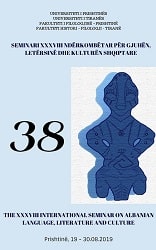Të jetosh në një ëndërr-mashtrim: përjetimi i poezisë së Agollit
Living in a Dream-deception: Experiencing Agolli’s Poetry
Author(s): Anila MullahiSubject(s): Cultural history, Poetry, Albanian Literature, Post-War period (1950 - 1989), Transformation Period (1990 - 2010)
Published by: Univeristeti i Prishtinës, Fakulteti i Filologjisë
Keywords: Literature; basic color; terms; symbols; interpretation;
Summary/Abstract: Agolli's literature during the 1960s -70s were characterized by optimism and constructing the cult of the future. In the poems dedicated to his country, he creates verses that synthesizes the dream of a bright future, insists on building the "New World," believes that he is living it by fulfilling his task as a poet to reflect it in verses. In these years, formally, his poetry will be expressive, rhythmically elaborated and dynamic. In 1976, the poet will write "with the beautiful dreams that never leave me in peace", and believing in the ideology of the time, hopes that he has found the way to be in such condition: "And happy I am, my army of war, of labor ...”. The poet believes that his dreams are fulfilled, and indeed he is sure that is living the dream of many generations. After the 90s, Agolli's verses change completely; they become thoughtful, sad, and philosophical. The pain of fleeing youth becomes very strong when he has to recall the dreams of those years and the reality that was so different from what he dreamed of. In the volume "Late Pilgrim" the poet appears as a disappointed idealist. He realizes that the life he has lived, his dreams and the ideals in which he believed are not true, they resulted in deception. The poet is awakened by a bizarre, dreamy and long dream that has lasted as long as all his life. Agolli believed that he was part in building a society at the margins of the ideal, and after the 1990s, he realized that he was unconsciously part of a violent reality, a lie. What he has dreamed and dealing with the truth made him feel lonely, but he finds the strength to continue to live; for the poet living means to continue to write.
Journal: Seminari Ndërkombëtar për Gjuhën, Letërsinë dhe Kulturën Shqiptare
- Issue Year: 2019
- Issue No: 38.2
- Page Range: 175-185
- Page Count: 11
- Language: Albanian

